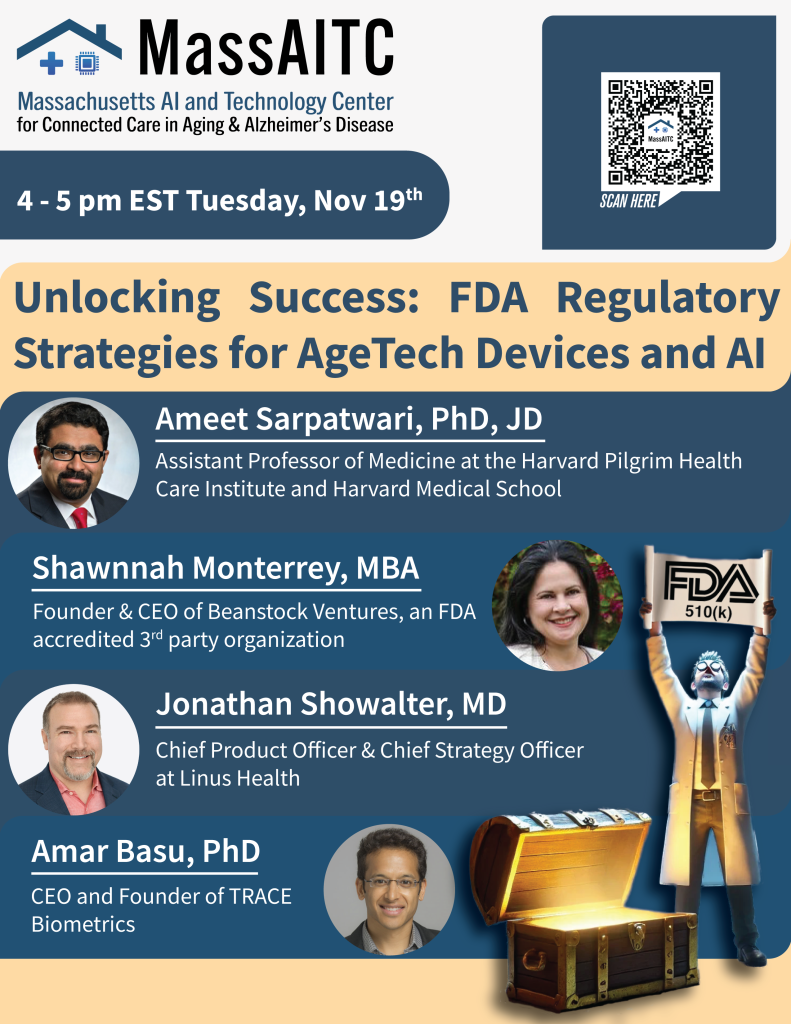Abstract:
This webinar explores regulatory strategies for bringing AgeTech devices and AI innovations to market under FDA oversight. Panelists provided an overview of FDA pathways, including 510(k), De Novo, and Pre-Market Approval (PMA), highlighting how device classification and intended use shape regulatory requirements. Discussion emphasized unique challenges for software as a medical device (SaMD), clinical decision support (CDS) tools, and AI/ML-enabled technologies, including validation standards and cybersecurity mandates. Speakers underscored the importance of aligning regulatory strategy with business models and offered guidance on leveraging Pre-Submission processes and breakthrough device designation to accelerate approval. Real-world insights from wearable device development illustrated the complexities of clinical validation, reimbursement planning, and risk-based regulation.
You will gain practical knowledge on navigating FDA processes to responsibly develop and deploy AgeTech innovations for older adults.
About the Speakers:
- Ameet Sarpatwari, PhD, JD, Assistant Professor of Medicine at the Harvard Pilgrim Health Care Institute and Harvard Medical School
- Dr. Sarpatwari previously served as Assistant Director of the Program On Regulation, Therapeutics, And Law (PORTAL) within the Division of Pharmacoepidemiology and Pharmacoeconomics. His research draws upon his interdisciplinary training as an epidemiologist and lawyer and focuses on the effects of laws and regulations on therapeutic development, approval, use, and related public health outcomes.
- Shawnnah Monterrey, MBA, Founder & CEO of Beanstock Ventures, an FDA accredited 3rd party organization
- She is the CEO and founder of BeanStock Ventures, with 20+ years’ experience in medical and life science software product development. BeanStock Ventures is an FDA accredited third party 510(k) review organization. Prior to founding BeanStock Ventures, she held product development management positions across numerous global firms, including Illumina, Invetech, Medtronic and Carl Zeiss Meditec. During her time at Carl Zeiss Meditec, Shawnnah and her team successfully launched and obtained several 510(k) clearances for an AI based glaucoma diagnostics and monitoring application, using a neural network and support vector machine, in the early 2000s.
- Jonathan Showalter, MD, Chief Product Officer & Chief Strategy Officer at Linus Health
- Dr. Showalter is the Chief Product Officer & Chief Strategy Officer at Linus Health a digital health platform company focused on transforming brain health. He is a dual board-certified primary care physician. Prior to joining Linus Health, he spent five years as Chief Product Officer at Jvion, a leader in clinical AI. His experience also includes 10 years at health systems, most recently serving as CMIO and CHIO at the University of Mississippi Medical Center, where he also practiced clinically in family medicine.
- Amar Basu, PhD, Professor, Electrical and Computer Engineering at Wayne State University and CEO and Founder of TRACE Biometrics
- Dr. Basu is is a professor of Electrical and Computer Engineering, with a joint appointment in Biomedical Engineering at Wayne State University. He is PI of the Microfluidics and Bioinstrumentation Lab, and director of the Wayne State Nanofabrication Facility. His overall research interests are in building translatable lab-on-a-chip and microelectronic systems for biotech and biomedicine. He founded TRACE Biometrics to commercialize a patented earable for remote patient monitoring of orthostatic hypotension.

